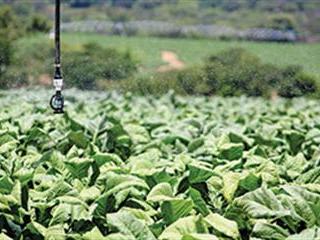
On your recent visit to Zimbabwe, did you find anything that surprised you?
As someone who lost three farms to the Zimbabwe government in 2000, it was an eye-opener for me to find a friend who is still farming at a very high level of production. His is a story of extreme courage and I wondered how many South African farmers would persevere under the same circumstances. This particular farmer – one of perhaps 170 of a kind remaining in Zimbabwe – must fulfil several duties and services in order to live in relative peace with hundreds of neighbouring farmers who surround him on 1 000ha of land that had previously belonged to him.
Speaking to the media can jeopardise that relationship so he asked not be named in this article.Today, he farms 250ha, but his operation is a hive of productivity in the lush bush which looks like Zambia in the 1980s. Driving along the dirt roads you see a few maize tassels above the elephant grass, a goat and some cattle move out of the way, a mother with a child on her back walks down to the stream to collect water.
And then, around the corner, three centre pivots covering 80ha, 70 women reaping tobacco onto six tractors and trailers, two tractors rigged up to spray and two more tractors ploughing for the next season. The chatter of the reapers and supervisors and the roar of 10 tractors make a surprisingly good sound.
Can you describe the production system on your friend’s farm?
Three curing units provide heat and air for the tobacco while two generators at the river run the pivots. There are two standby generators for power cuts. This commercial operation produces a large amount of produce for the market, and the tobacco venture employs more than 200 people. The minimum wage is just over US$3/day. The day starts at 4.30am with tobacco taken from the barns and placed on racks in the shed for conditioning. At 6am, staff go home for breakfast. During the morning the farmer supplies liquid porridge in 1l bottles to field staff.
For accountability, the trailers are colour coded and on returning to the tobacco barns, full trailers drive over a weighbridge to ascertain that bulk loose tobacco has been properly filled. Trailers that don’t make the cut go back to the lands for re-packing. With the exception of some irrigated tobacco in storage, waiting for grading, the season ends when the last barn has been reaped.
The farmer can choose to hold tobacco, or sell immediately. The tobacco selling system, whether by auction or private treaty, is exceptionally well managed, and provides the farmer with a number of choices.This farmer grows 15ha of maize at his own cost for staff consumption. When the crop reaches maturity, it is handed over to the farm committee for distribution. The farmer subsidises the staple diet (mealie meal) and there is a reliability gift hamper every month for workers who don’t miss a day.
During the hyper- inflation period, the farmer traded some diesel for soap and sugar to help his staff. Because the beer lorry no longer travelled into the district, his staff used the sugar to brew and sell their own beer.
How does the farmer deal with security issues?
The farmyard is pretty much standard with an electric fence running around the homestead, tractor sheds and tobacco barn. There are three guards on permanent duty inside the fence. House and garden staff leave the area at 4.30pm while the farmer and his family take normal security measures at night. Two tail-wagging Labradors help, but typical guard dogs are taboo as they would be poisoned.
After all these years, security units still tend to query meetings where a few white farmers gather to discuss farming problems. So, these, like politics, are avoided. Aside from special occasions, farmers and their families tend to spend every night on the farm, cutting late night driving to the minimum.
Is he involved in his community?
The farmer takes community involvement seriously. His vegetable and fruit garden delivers a weekly box of greens to people in need when the farm lorry takes produce to Harare. His vehicles are used to drop off pensioners who need to collect their monthly payment. A farm bakkie transports staff to hospital. Road maintenance is a major headache after years of neglect, so the farmer uses four graders to keep his 30km stretch of dirt road in good condition.
Once a month he mows and spruces up the police camp, – much to the appreciation of the police force. The farmer has committed himself to building one new fully equipped classroom every year at the local school and he organises the local football league. Participating teams pay him US$250 to draw up the roster and arrange the prize money.
What about livestock production?
Livestock farming is complicated. All possible reasons for confrontation are avoided. Sometimes a neighbour claims compensation when another’s cattle stray into a maize land. Sometimes during the hot, dry months young lads take their dogs out hunting for small game and burn the bush till the entire countryside is black without a blade of grass prior to the rain.
Should you wish to move any livestock, the first step is to fetch a policeman to verify that they aren’t stolen and then to return him to his base. Next, fetch a staff member from the local vet to obtain a movement permit, and return him to his office. The two officials refuse to travel together. Having obtained the required police and vet permits you should start your journey at 4am to avoid roadblocks where you might be asked for a sheep.
How do you see the future of farming in Zimbabwe?
Despite the restrictions, the positive is that this man is still farming – something you can only truly appreciate when you know, like I do, what it’s like to have lost your farm. Some white farmers are leasing their farms from the new owners. I believe that compensation for farm improvements will eventually be addressed. The Zambian 99-year lease formula is a future possibility although, in Zimbabwe, commercial agriculture is beginning to look at black-owned farms for food security projects. One group is planting thousands of apple trees this year.
About 40 000 farmers are now producing tobacco. Although a big percentage consists of light yields, which does not produce ‘flavour tobacco’, increasingly the small-scale growers are learning to produce yield for flavour. Of course, the backbone of the tobacco industry is the large external groups, such as BAT, the Chinese, and the Zimbabwe buying companies that supply the inputs for tobacco, but then recoup all costs at point of sale.
The focus on tobacco rather than maize could, however, eventually impact on food security. Most of the current successful black farmers in Zimbabwe bought their farms, took title and were commercially managing their farms before the land redistribution took place. Many were assisted and mentored by neighbouring commercial farmers and have been able to take advantage of government financing schemes in the last 12 years.
Richard Tate farmed in Zimbabwe for more than 30 years until he lost his Terragwaai Farms, at Matepatepa, Zimbabwe in 2000 to the Zimbabwe government’s Land Acquisition Programme. He planted tobacco, maize, wheat, soya beans and citrus on 600ha and ran a herd of 500 Sussex breeding cows. As president of the Zimbabwe Tobacco Association, and later the International Tobacco Association, he was involved in initiatives to increase small farmer participation in tobacco growing.













